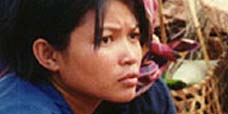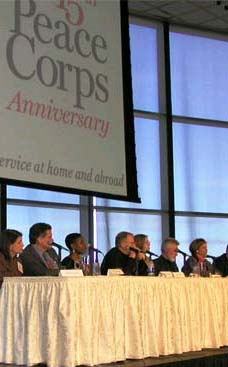
"What, then, makes the Ongesas different? What provides them with such contentment? What is the secret to their happiness? The answer, I believe, comes down to several things. First, there is profound connection to other people. They are deeply embedded in a family and community. se\cond, they appreciate what life has given them. There is a sense of gratitude that they possess, despite the hardships they experience. Third, they are fundamentally good. To their very core they are ethical beings."
Arthur Dobrin writes on a communion with the Ongesas in Kenya
A Communion
Mar 1, 2006 - Humanist
LYN AND I ARE SITTING in the house of Joshua and Raili Ongesa. This is in the East Africa village of Tabaka, in the Kisii area, not far from Lake Victoria. We've known Joshua and Raili for more than forty years, ever since we became friends when Lyn and I were Peace Corps volunteers in Kenya in the middle 1960s.
When we first met the Ongesas, Lyn and I were recently married, just out of college, both products of the New York suburbs; Joshua and Raili were about ten years older than we, peasant farmers with little formal education. At that time, they had a small income from growing coffee. They also sold maize grown on a rented plot not far from their own farm. In addition, Joshua was a soapstone sculptor who, over the years, specialized in chess sets that sold around the world.
Four decades later he and Raili continue to live on their plot of about two acres. They grow less maize than before since they can no longer afford to rent the extra plot of land. They do, however, tend a small hillside garden where there are greens and beans. They draw their water from the river below since they don't have running water. Their coffee trees are gone now, uprooted a number of years ago when the price of coffee had gone so low on the international market that it hardly paid to grow it any longer. The area once given over to the coffee is a grassy space between the road and the house and is used by children as a playground.
Something else has changed around his house. There used to be cows cropping the grass here and giving milk to the family. Today there isn't a single cow. Little milk is available.
Joshua has grown old. His eyesight is failing. Cataracts, we suspect. In the last year while carving he has cut himself several times. He owns a pair of glasses, but they aren't much help. So he no longer carves and his income is sharply reduced. He is also very thin. Recurrent malaria, something from which he has suffered for at least twenty years, seems to have taken its toll. His teeth are beginning to fall out.
"Pole," Lyn says, taking his hand. "I'm sorry."
Joshua smiles. "It's only old people's problems."
Raili takes us to a mound next to the cooking house. She tells us that this is the grave of one of her daughters, who died suddenly last year. No one knows the cause. We ask about Joyce, another daughter, who had disappeared nearly twenty years ago. They hear rumors that she is in Tanzania but Raili doesn't know whether this is true.
We know this house well: three rooms altogether not much bigger than the living room in our Long Island home. There are two beds, a few chairs and a couple of crude tables, suitcases that serve as drawers and closets. The walls are made of mud, dung, and powdered soapstone, the roof of corrugated metal. There is a window in each room but no glass. Shutters open to the light during the day. Without electricity, a kerosene pressure lamp illuminates one of the rooms as we await dinner.
Food is prepared in another house on the compound. Raili is there with several other women and children, squatting, cooking on the ground. There is no stove or oven; there is no table. The wood fire throws off the only light.
Since there is no running water, a kettle of warm water is brought for us to wash before eating. There is a nib of soap and a hand towel for our use. Tonight, in our honor, there is roasted goat, chicken stew and greens, rice, eggs, beans, two kinds of ugali (one thickened porridge made from ground corn, the other from millet meal), chapatis (Indian flat bread), soda and tea. Before dinner, Raili says grace. We eat in the traditional way, without cutlery, with our fingers.
Children come and go. They bring food, take away the empty dishes, eat in the entry room. There is no shouting, no loud noises, only hushed voices. It's as if this is choreographed and everyone is moving to a well-rehearsed ballet. I look down for just a moment and, without my noticing, someone else is seated next to me. It is one of Joshua's brothers. Shortly after and just as unobtrusively, he is replaced by a nephew; a neighbor; another brother; a sister- in-law; a friend; a son; a daughter; a grandchild.
I get upset and angry when I think about the Ongesas' lives. Lyn and I can afford to visit them every few years but they can barely afford the fare for the small bus to take them to town fifteen miles away. We give away more good clothes every year than they have in a decade. We take several vacations a year and travel the world. They have never had a vacation and have been to Nairobi a few times. We have seen all the wildlife Africa has to offer. They live about fifty miles from a great game park, but have never seen an elephant, rhino, buffalo or lion. We have two cars; they mostly walk where they have to go.
Our list of possessions is endless; theirs can fit on a note card.
We have been in this house many times before, Still, I can't imagine living with so little, without what to me aren't luxuries but essentials. Yet here is the paradox. Joshua and Raili meet life with great equanimity and nobility. In fact, I think they are happier than almost everyone I know. So, while I am greatly troubled by the injustices they suffer, I am also immensely inspired by their lives.
What I see in my old friends is very far from what I observe in my home country. A U.S. government report states that 30 percent of the American population is anxious and that depression is on the rise. A quarter worry that they won't be able to pay their bills and a huge number of people are in significant debt. Despite the unprecedented standard of living in America today, expectations for a higher standard of living are frustrated, a frustration that takes the form of cynicism, irony, low-level malaise and, occasionally, outright rage.
My own observations bear this out. While we Americans enshrine the pursuit of happiness as an inalienable right, few people are happy. I hardly know anyone who doesn't complain about not having enough time or money. Whatever we have-possessions, accomplishments, prestige, health-we want a little more, as if the latest gadget, greater wealth or better prescription will give us what we need to complete the happiness puzzle. Of course, some things do make our lives easier. More money could make a profound difference in some lives. Affordable medical care can be a great relief when you get sick, living in a safe neighborhood adds to peace of mind and being able to eat healthy and provide a decent education for your children are all important.
But most misery is self-inflicted. Selfishness and aggression often get the better of us. The truth remains as religion, philosophy and popular wisdom have always taught-the most valuable things can't be purchased or packaged. You can't buy love or meaning. Happiness has no price tag.
There is a kind of peacefulness that we feel as we sit with the Ongesas in the dark house. Lyn searches to find the right words for what we see and feel. Finally, she says, "it is biblical." This meal, this experience, is a kind of communion. This isn't to sentimentalize or romanticize their lives nor is it to overlook the injustices of the world that gives me so much in terms of material rewards and leaves them with so little. If we paid more for our coffee at the supermarket in New York, they would have had enough money to send all their children to school. With only a little money in all likelihood Joshua would still be able to see well today.
An equitable distribution of the world's wealth would mean that they could afford a cistern to collect rainwater and be able to pay for a simple operation at the local hospital. If only they lived in a less corrupt country, they would have better medical care and schools and maybe a pension from the government. If only Kenya hadn't been flooded with guns from surrounding countries engulfed in civil wars, the property crimes wouldn't be so deadly. Many things would ease their lives and bring them greater pleasure. Nevertheless, they possess something that can't be bought.
This also isn't to say that life was better in simpler times and that modern life is inevitably and inescapably the cause of our unhappiness. I know that the Ongesas aren't typical around their home. At least since the 1950s Kisii has had a violent crime rate greater than New York City's. AIDS is rampant; nearly 20 percent of those between the ages of twenty and forty are HIV-positive. The local economy has nearly collapsed because of the same problems with corruption that I had written about in 1966. Fear of jealous neighbors is pervasive and the government is still trying to put a stop to the lynching of reputed witches.
I suspect that if Kisii were included in Ruut Veenhoven's World Database of Happiness it would find itself near the bottom of the list, with other places that lack material comfort, social equality, political freedom and access to knowledge. Without these factors, few people report being happy. So the Ongesas are exceptions even in Kisii and they have a reputation there of being exceptional as well.
What, then, makes the Ongesas different? What provides them with such contentment? What is the secret to their happiness? The answer, I believe, comes down to several things. First, there is profound connection to other people. They are deeply embedded in a family and community. se\cond, they appreciate what life has given them. There is a sense of gratitude that they possess, despite the hardships they experience. Third, they are fundamentally good. To their very core they are ethical beings.
The Ongesas are also deeply religious. Ever since we've known them, they have been active in the local Seventh Day Adventist Church. Joshua had once served as the president. It widens their world and ties them to something beyond this time, this place. As a Humanist I don't share their theology, but I recognize the way in which their religious convictions offer them hope. I don't think that their particular religion is the only way nor do I think that religion as such is necessary. What I do believe, though, is that there needs to be a deeply held philosophy-not one that is necessarily articulate-that connects you to both the future and the past and cultivates in you a sense of gratitude for what you have inherited and a sense of responsibility to future generations.
As researchers Emmons and McCullough note, "Grateful individuals place less importance on material goods; they are less likely to judge their own and others success in terms of possessions accumulated; they are less envious of wealthy persons; and are more likely to share their possessions with others relative to less grateful persons." This is what I mean by spirituality and it is a necessary component of a happy life.
As I reflect on the roiling discontent of modern life, I turn to the Ongesas as an example of what is possible. I see them as a model, a convincing one, as it is their behavior and their attitude that makes them so admirable. In this way, they point to the possibility of getting closer to the ever-elusive goal of living happily-this, for them, in the face of tragedy and serious deprivation.
Happiness is possible if you cultivate yourself in their direction, one shared by much of the world until relatively recently. I am thinking of happiness in the older, more profound sense of the word. Literature professor Stanislaw Baranczak points out that in Slavic languages the word is restricted to either "rare states of profound bliss, or total satisfaction with serious things such as love, family, the meaning of life, and so on." This understanding of happiness helps explain Maxim Gorky's response to his visit to America in the early part of the twentieth century, when he was taken to Coney Island.
He saw the rides, all the concessions, games and shows. At the end of the day his friends asked him how he liked it. He said, "What a sad people you must be." Americans were working so hard at finding happiness in things not serious. It was if amusement were all there was to happiness. While fun and play may well provide happiness, it isn't all there is to it nor is it the major part of it.
Soul-sustaining happiness involves developing habits and attitudes that foster ethical relationships. Joy and happiness result from living properly and celebrating the human condition. My religious tradition calls this ethical culture. This is paying attention to what you are doing and feeling and entails self- scrutiny and education, but not in a self-centered or hedonistic way but in the context of good relations. Such an approach helps lift you over the losses that are inevitable, the setbacks, the accidents, the illnesses.
When you are not in harmony with others, when you separate yourself from the world around you, when you use others strictly for your own purposes, when you disregard and disrespect others, when you treat others unjustly, when you think that you are more-or less- than others, then you become soul sick. The happy person is the humane person. An ethical life-a good life-fosters human flourishing and leads to deep satisfaction. Living ethically, feeling connected to and responsible for something larger than yourself and acting on this in a spirit of generosity and with a sense of appreciation is to practice the lost art of happiness.
The most valuable things can't be purchased or packaged. You can't buy love or meaning. Happiness has no price tag.
Arthur Dobrin is professor of humanities at Hofstra University and from 1968 to 2001 served as leader of the Ethical Society of Long Island.This article is adapted from his forthcoming book, The Lost Art of Happiness.
Copyright American Humanist Association Mar/Apr 2006


















